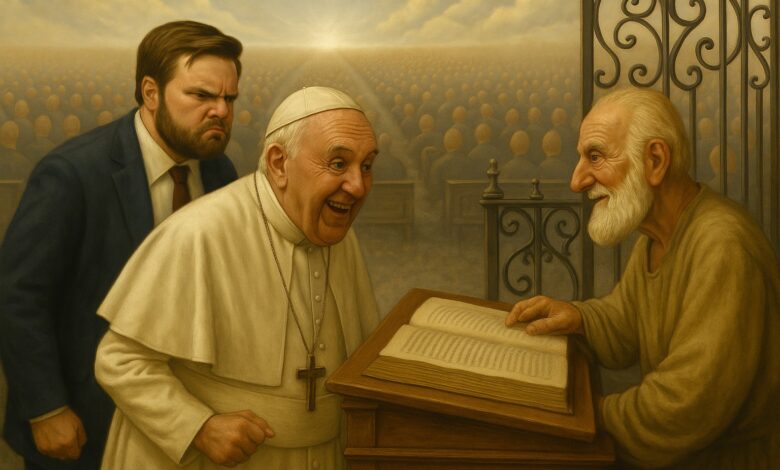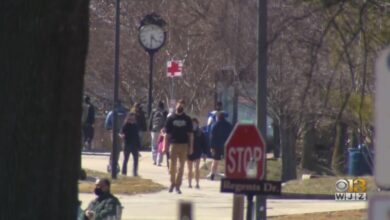The Vice President Meets the Pope

On April 20, Vice President JD Vance, a Catholic, had a brief meeting with Pope Francis, just a day before the pontiff’s passing. Despite their differing views on immigration policies, the encounter did not touch upon this contentious issue. Earlier in the year, Francis had criticized mass deportation plans, stating that it undermines the dignity of many individuals. While it may be challenging not to empathize with the late pope’s concerns, a closer examination reveals a more intriguing perspective.
Pope Francis, known for his advocacy of social justice, stands in stark contrast to JD Vance, who aligns himself with conservative ideologies. The question arises as to how these two individuals, belonging to the same faith, can hold such divergent views. Is this discrepancy irreconcilable? Perhaps a nuanced analysis could shed light on this apparent contradiction. Interestingly, both individuals could find common ground by delving into classical liberal political economy, a realm they may not be well-versed in.
According to classical liberal and libertarian theorists, the concept of social justice is most coherent within an authoritarian system, where political authorities dictate rewards and punishments. In a spontaneous order, such as a free market economy, rewards and punishments are determined by impersonal factors like market demand, luck, and natural laws. Three prominent thinkers in this realm offer insights into this perspective. Friedrich Hayek, in his work “The Mirage of Social Justice,” challenges the notion of social justice within a spontaneous order. Anthony de Jasay, an anarcho-liberal economist, advocates for a similar stance, emphasizing the role of spontaneous conventions in shaping societal norms. James Buchanan and the Constitutional Political Economy school propose a contractarian theory of justice based on unanimous consent, rejecting the imposition of justice by political authorities.
In essence, both Pope Francis and JD Vance uphold the idea of social justice, wherein political authorities dictate societal rewards and punishments. The pope advocates for favoring the poor globally, while Vance supports policies that benefit groups favored by American political elites. Despite their differences, both individuals share a collectivist mindset, prioritizing collective decisions over individual choices in distributing rewards and punishments. Whether in the Francis-style or the Vance-style, the concept of social justice stems from a broader collectivist ideology that values political influence in shaping societal outcomes.
In conclusion, the meeting between Vice President JD Vance and Pope Francis highlights the nuances of differing perspectives within the Catholic faith. While their views on social justice may diverge, a deeper exploration reveals the underlying collectivist ideologies that drive their beliefs. As we reflect on this encounter, it prompts us to consider the complexities of reconciling diverse viewpoints within a shared faith tradition. JD Vance, author of “Hillbilly Elegy,” recently met with Pope Francis to discuss their shared belief in social justice. While both Vance and the Pope advocate for a fair and just society, their approaches to assigning rewards and punishments differ.
In heaven, where scarcity does not exist, the allocation of resources is merely symbolic and holds no practical consequence. However, the concept of social justice remains a fundamental principle that guides the actions and beliefs of both Vance and the Pope.
Vance, a conservative author and political commentator, emphasizes personal responsibility and self-reliance as key components of a just society. He believes that individuals should be held accountable for their actions and that hard work should be rewarded accordingly. This meritocratic approach to social justice aligns with traditional conservative values and emphasizes the importance of individual agency.
On the other hand, Pope Francis, as the leader of the Catholic Church, advocates for a more compassionate and inclusive approach to social justice. He emphasizes the importance of caring for the most vulnerable members of society and working towards a more equitable distribution of resources. The Pope’s focus on solidarity and empathy reflects his belief in the inherent dignity of every human being and the need to address systemic inequalities.
While Vance and the Pope may have different perspectives on how to achieve social justice, their meeting serves as a reminder of the importance of engaging in dialogue and finding common ground. By coming together to discuss their shared values and beliefs, they demonstrate that despite their differences, there is always room for respectful conversation and collaboration in the pursuit of a more just and equitable society.





